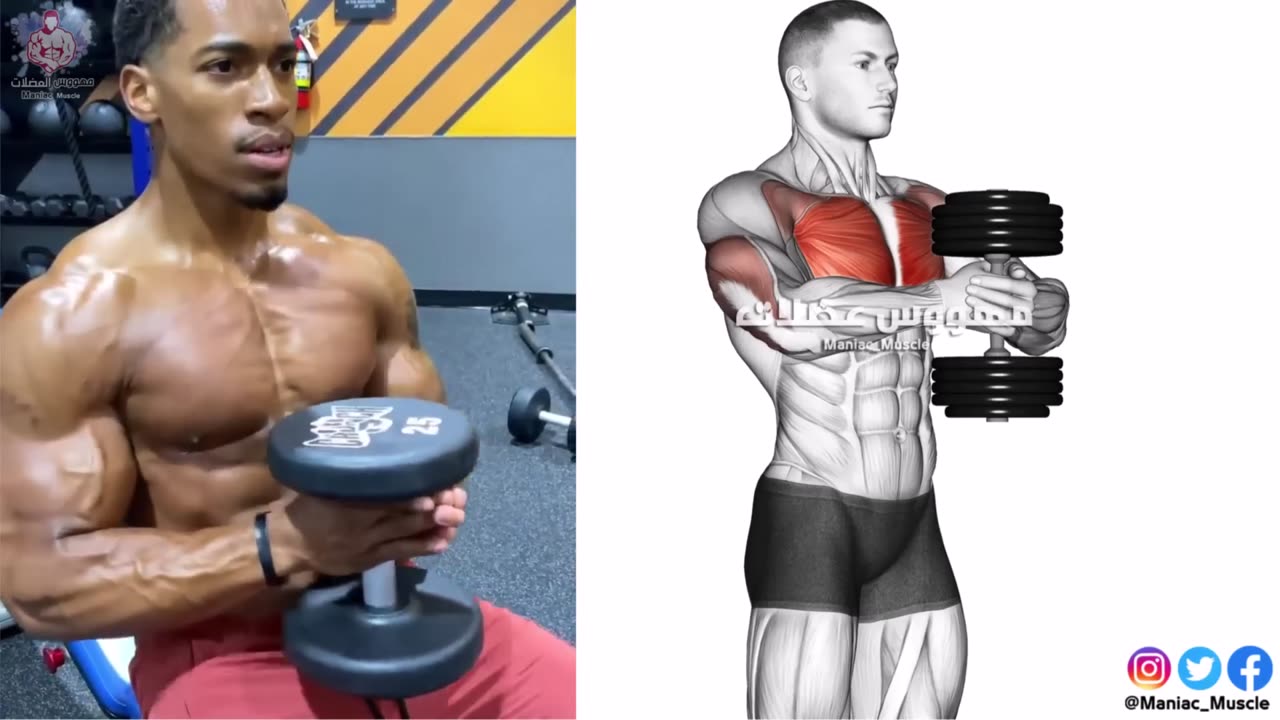Premium Only Content

How To Build Your Chest Fast (6 Effective Exercises)
Building your chest muscles quickly requires a well-structured workout routine and attention to key factors such as exercise selection, proper form, progressive overload, and adequate nutrition. Here's a brief overview of how to build your chest fast:
Compound Exercises: Incorporate compound exercises that target your chest muscles effectively. Bench press (flat, incline, or decline variations), push-ups, and dumbbell presses are excellent choices.
Proper Form: Maintain proper form during exercises to maximize muscle activation and prevent injuries. Focus on controlled movements and a full range of motion.
Progressive Overload: Gradually increase the weight or resistance you use in your workouts. This concept challenges your muscles to adapt and grow over time. Aim to increase either the weight lifted or the number of repetitions you perform.
Variation: Include a mix of exercises to target different parts of the chest. This can prevent plateaus and ensure balanced muscle development.
Frequency and Consistency: Train your chest muscles 2-3 times a week with sufficient rest between sessions. Consistency is key to seeing noticeable gains.
Nutrition: Consume a balanced diet with enough protein to support muscle growth and repair. Include lean sources of protein, complex carbohydrates, healthy fats, and a variety of vitamins and minerals.
Rest and Recovery: Allow your chest muscles to recover adequately between workouts. Sleep well and manage stress, as these factors play a crucial role in muscle development.
Supplements: While not essential, some individuals may benefit from protein supplements or creatine to support muscle growth and recovery. Consult a healthcare professional before using any supplements.
Warm-Up: Always warm up before your chest workouts to increase blood flow and prevent injuries.
Track Progress: Keep a workout journal to track your exercises, weights, repetitions, and sets. This helps you monitor your progress and make necessary adjustments.
Avoid Overtraining: While working hard is important, avoid excessive training that can lead to overuse injuries. Listen to your body and give yourself time to recover.
Remember that building muscle takes time and dedication. It's essential to balance intensity with proper technique and recovery for the best results. If you're new to working out or have any health concerns, consider consulting a fitness professional or healthcare provider before starting a new exercise routine.
-
 14:25
14:25
Degenerate Jay
19 hours ago $1.59 earnedThe Flash Movie Failed Because People Hate The Character? Sure.
20.6K8 -
 28:30
28:30
CharLee Simons Presents Do Not Talk
5 days agoSam Anthony from YourNews.com (with host CharLee Simons)
17.1K1 -
 52:34
52:34
PMG
15 hours ago $1.13 earnedHannah Faulkner and Steve Friend | EXPOSE THE FBI CORRUPTION - KASH PATEL
11.9K6 -
 25:33
25:33
marcushouse
1 day ago $36.78 earnedStarship Exploded! What Went Wrong? Flight Test 7 Explained
175K60 -
 1:00:50
1:00:50
Squaring The Circle, A Randall Carlson Podcast
1 day ago#035 Cosmic Catastrophe In The Age Of Leo - Squaring The Circle: A Randall Carlson Podcast
110K30 -
 1:33:14
1:33:14
Jamie Kennedy
1 day agoThe LA Fires...
89.6K20 -
 2:01:45
2:01:45
Quite Frankly
2 days ago"Inauguration Eve: Trump Time Travel Review" 1/17/25
68.1K64 -
 58:42
58:42
SGT Report
4 months agoYour REAL NEWS vs. CIA Mockingbird LIES -- Sam Anthony
195K97 -
 2:59
2:59
LimitlessAmbition
1 day ago $14.88 earnedPROVE THEM WRONG With This POWERFUL Motivation!
156K6 -
 8:31:37
8:31:37
G2G Gaming Channel
20 hours agoGive me my Helmet, Im going in!! #RumbleGaming
138K3